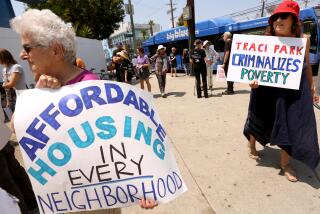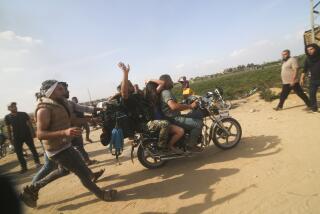PLO Issue: Policing the Police : Authoritative report raises questions about abusive Palestinian groups
- Share via
B’Tselem, the Israeli human rights group whose monitoring of abuses of Palestinians by Israeli authorities often arouses official ire, has now taken a long look at Palestinian crimes against Palestinians and issued a report that raises uncomfortable questions for both the Palestine Liberation Organization and the government of Israel.
In brief, B’Tselem finds that over the last six years as many as 950 Palestinians in the Gaza Strip and West Bank were murdered by other Palestinians, many after being tortured. Virtually all were alleged to have collaborated with Israeli occupation authorities. In fact, B’Tselem found, most had not. Some, including homosexuals and prostitutes, were killed for being “morals offenders.” Others were killed to settle old scores having nothing to do with the Israeli occupation.
B’Tselem holds both the PLO and its political rival, the Islamic fundamentalist group Hamas, responsible for the torture and killings, either directly or, most often in the case of the PLO, for implicitly condoning them. The PLO, which expects soon to take over from Israel partial administration in the territories, is severely faulted for failing its political responsibility to try to halt the killings.
Saleh Abdel Jawad, a political scientist at Birzeit University, goes to the heart of the matter for Palestinians by noting that the B’Tselem report raises crucial issues of “what kind of democracy will we have, what kind of society will we be?” The PLO promises a “democratic and secular” state, which would be the Arab world’s first. A basic obligation in such a society is to respect the humane rule of law. Is the PLO ready to meet that imperative?
And, B’Tselem asks, is Israel ready to meet its obligation to protect the estimated 5,000 Palestinians who have served as agents for occupation authorities? These are not parochial issues. Human rights standards are valid measurements in helping the United States and other democracies determine the warmth and depth of their relations with other governments. The rights record in the occupied territories isn’t good. There is a chance to begin immediately to improve on it. Do Israel and the PLO have the will and courage to seize that chance?
More to Read
Sign up for Essential California
The most important California stories and recommendations in your inbox every morning.
You may occasionally receive promotional content from the Los Angeles Times.













